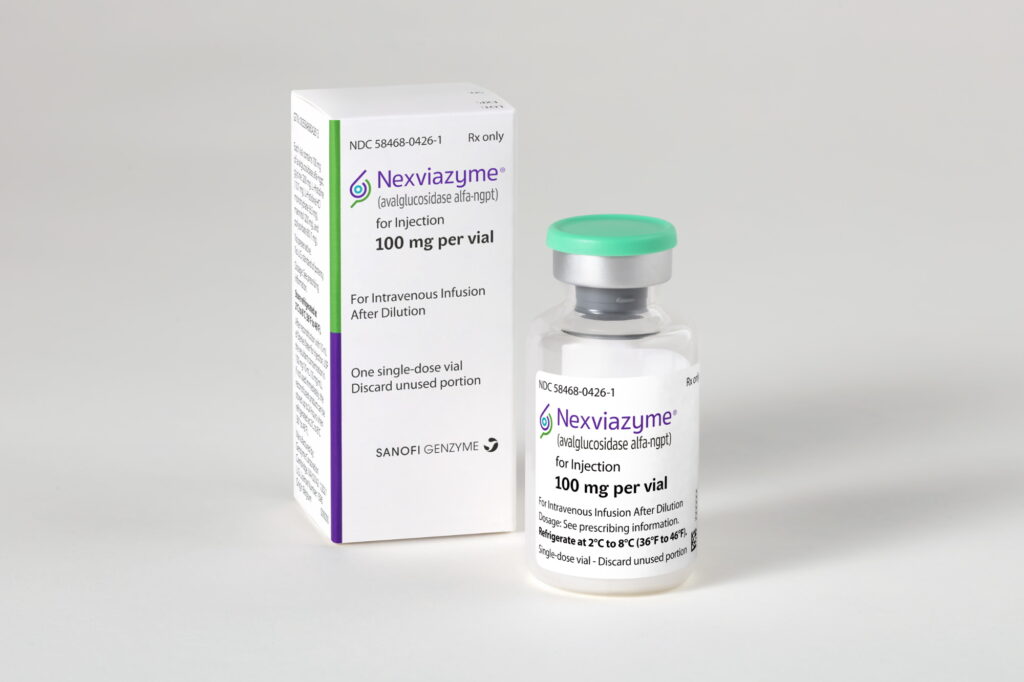FDA批准治疗庞贝病的新疗法

The Food and Drug Administration (FDA) has approved Nexviazyme (avalglucosidase alfa-ngpt), a hydrolytic lysosomal glycogen-specific enzyme, for the treatment of late-onset Pompe disease in patients1year of age and older.
2021年8月8日美国食品和药物管理局 (FDA) 已批准 Nexviazyme(avalglucosidase alfa-ngpt),一种水解溶酶体糖原特异性酶,用于治疗1岁及以上患者的迟发性庞贝病。
Patients with Pompe disease have an enzyme deficiency that leads to the accumulation of a complex sugar, called glycogen, in skeletal and heart muscles, which cause muscle weakness and premature death from respiratory or heart failure. Normally, glycogen — the stored form of glucose— breaks down to release glucose into the bloodstream to be used as fuel for the cells.
庞贝病患者缺乏酶,导致骨骼肌和心肌中积聚称为糖原的复合糖,从而导致肌肉无力和呼吸或心力衰竭导致的过早死亡。通常,糖原(葡萄糖的储存形式)分解以将葡萄糖释放到血液中,用作细胞的燃料。
“Pompe disease is a rare genetic disease that causes premature death and has a debilitating effect on people’s lives,” said Janet Maynard, M.D., deputy director of the Office of Rare Diseases, Pediatrics, Urologic and Reproductive Medicine in the FDA’s Center for Drug Evaluation and Research.
“庞贝病是一种罕见的遗传疾病,会导致过早死亡,并对人们的生活产生不利影响,”FDA 药物评价中心和研究罕见病、儿科、泌尿科和生殖医学办公室副主任 Janet Maynard 医学博士说。
Nexviazyme, an enzyme replacement therapy, is an intravenous medication that helps reduce glycogen accumulation. The effectiveness of Nexviazyme for the treatment of Pompe disease was demonstrated in a study of 100 patients who were randomized to take Nexviazyme or another FDA-approved enzyme replacement therapy for Pompe disease. Treatment with Nexviazyme improved lung function similar to the improvement seen with the other therapy.
Nexviazyme 是一种酶替代疗法,是一种有助于减少糖原积累的静脉注射药物。Nexviazyme 治疗庞贝病的有效性在一项对 100 名患者的研究中得到证实,这些患者随机服用 Nexviazyme 或另一种 FDA 批准的用于庞贝病的酶替代疗法。 Nexviazyme 治疗改善了肺功能,类似于其他治疗所见的改善。
The most common side effects included headache, fatigue, diarrhea, nausea, joint pain (arthralgia), dizziness, muscle pain (myalgia), itching (pruritus), vomiting, difficulty breathing (dyspnea), skin redness (erythema), feeling of “pins and needles” (paresthesia) and skin welts (urticaria). Serious reactions included hypersensitivity reactions like anaphylaxis and infusion-associated reactions, including respiratory distress, chills and raised body temperature (pyrexia). Patients susceptible to fluid volume overload or with compromised cardiac or respiratory function may be at risk for serious acute cardiorespiratory failure.
最常见的副作用包括:头痛、疲劳、腹泻、恶心、关节痛(关节痛)、头晕、肌肉痛(肌痛)、瘙痒(瘙痒)、呕吐、呼吸困难(呼吸困难)、皮肤发红(红斑)、感觉针和针”(感觉异常)和皮肤贴边(荨麻疹)。严重反应包括过敏反应等超敏反应和输液相关反应,包括呼吸窘迫、寒战和体温升高(发热)。对液体容量超负荷敏感或心脏或呼吸功能受损的患者可能有发生严重急性心肺衰竭的风险。
(原创)美国希望之光医疗编译,欢迎转载,请注明出处。


